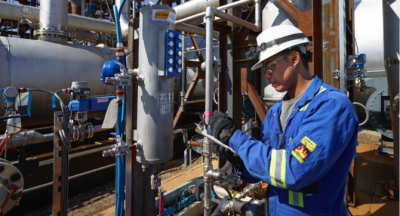Trash facility director aiming to construct alternative biofuel facility
If all goes as planned, the Zero Waste Solutions trash processing facility in Rochester could be among the first in the country to produce a renewable alternative to gasoline.
That's what Zero Waste CEO Mike Camara told Rochester's Board of Selectmen on March 19. He and David McDonnell, a representative of Canadian waste treatment company Enerkem, had an informal meeting with the selectmen, simply to see how board members felt about the idea.
The original plan for Zero Waste, according to Camara, was to convert waste into small bricks called EcoTac, which burn similarly to, but cleaner than, coal.
Then, a fire in 2016 tore a hole in the facility's roof, putting a stop to building plans. When Camara attempted to restart construction on the facility, he said that finding financing had been difficult.
When funding was found to begin construction again, Camara found out that there was another problem.
"The EcoTac factories we were going to work with are shutting down," Camara said. "We needed to find an alternative."
That's where Enerkem steps in. The Edmonton, Alberta, Canada-based company commenced production of cellulosic ethanol via solid waste in 2017.
Cellulosic ethanol (different than regular, corn-based ethanol) is a biofuel, derived directly from living matter, such as plants or waste. Fossil fuels, on the other hand, are derived from dead matter that is unable to be found or re-grown.
Cellulosic ethanol is created by thermally heating non-recyclable, non-compostable solid waste. The biofuel is considered a possible alternative to gasoline; the output of greenhouse gases emitted by cellulosic ethanol is 84 percent less than traditional gasoline, McDonnell said.
Enerkem currently has facilities that produce cellulosic ethanol in Canada, the Netherlands, and Minnesota.
To pursue the project in Rochester, Enerkem would need a site at or near the Zero Waste facility and around 10 acres in size. Municipal mixed waste would be trucked into the Zero Waste site and processed, to remove anything recyclable or compostable.
Whatever was left would be shredded and undergo a "gasification" process, where the waste would injected with steam and oxygen in order to create "thermal decomposition." Because nothing is burned, McDonnell said, there are no emissions from the process.
The gasification process does use a lot of water, though, he noted. Preliminary ideas for ameliorating water usage include using reclaimed wastewater from Wareham.
The resulting gas is then cleaned of elements such as ammonia and sulfur, and run over catalytic reactors to produce methanol, which is then further refined into cellulosic ethanol.
McDonnell said the Enerkem's method of producing cellulosic ethanol is the only Environmental Protection Agency approved method of creating cellulosic ethanol from solid waste in the United States.
The next step, McDonnell said, would be to approach the Department of Environmental Protection, seeing as the Selectmen had no overt objections to his and Camara's plans. McDonnell told the board that he wasn't entirely worried—the DEP had been in favor of a project they had tried to do in Taunton, where the land had turned out to be unsuitable for building.
Then, he and Camara would need to approach Rochester's Planning Board to begin the process of permitting the project correctly.
McDonnell said that Enerkem would also attempt to hold public hearings for town residents, alongside those required by the Rochester Planning Board during the permitting process.
"It's important that people in town know what's going on, and understand what we're trying to do," he said.
Camara noted that the plant would offer high-paying jobs to Rochester residents. "An opportunity for investment like this doesn't come often," he said.
















